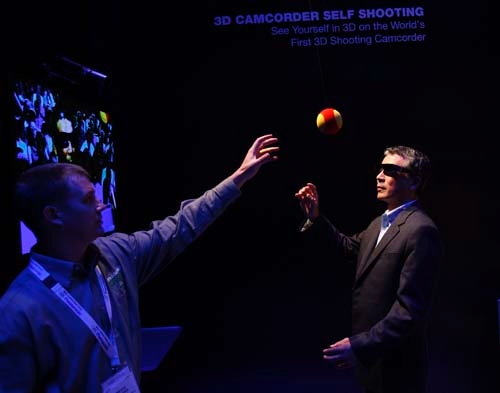CES panel shares views on next wave of personal tech
If you like change, you'll love personal technology in coming years.
A panel of high-tech experts at the International Consumer Electronics Show, in town through Sunday, shared their views on some of the bigger developments headed toward your personal computer and your television. The session, called "Big Thinkers, Disruptive Technologies," revealed some of the emerging devices and networks that will change the way consumers use technology.
Tablet personal computers such as the Apple iPad proved a hot topic at the session.
Mel Coker, vice president of product development and operations for emerging devices at AT&T, said tablet PCs, electronic book readers and navigational devices are "exploding," as are the applications that tech developers are creating for consumers who use the machines. How's that disruptive? It changes the ways people communicate and receive information about the world around them. Commuters might check out navigational devices before they leave for work to see if they should wait a few minutes for traffic to lighten, while fans at sports games can connect on tablets via Facebook.
Expect the future to bring additional apps for tracking devices and electronic health records, Coker said.
Mike Rayfield, general manager of mobile business for visual-computing developer Nvidia, called tablets "the next computing revolution."
Today's smaller devices have the technological capabilities of a top-of-the-line notebook PC from just two years ago, in a package that fits into users' pockets, Rayfield said.
"Before, you wouldn't have seen people at CES computing as they wandered around," he said.
"This period of time will be seen as a real inflection point. We have beautiful devices and beautiful content," Rayfield added. "It's going to be beyond disruptive. People will look back and be excited about being involved in it."
Also set to disrupt our way of life? Smart television.
Not only will the ability to connect to the Internet via TV change how consumers behave, it'll modify how advertisers reach out, said Levy Gerzberg, president and chief executive officer of software provider Zoran Corp. During TV-viewing of the future, you might see ads peddling only those products you're interested in. The change would allow smaller businesses to reach consumers via televisions, Gerzberg said.
Plus, 3-D TV technologies will continue to evolve, said Josh Greer, president of 3-D cinema equipment developer RealD. Right now, most in-home 3-D-viewing technology revolves around battery-powered shutter glasses. But such specs are "heavy and expensive," Greer said. Up next at home: Perhaps those lighter, plastic glasses they sell at movie theaters. And the in-home 3-D Holy Grail? Autostereo 3-D, for which viewers won't need glasses at all. That last innovation is likely quite a way off, Greer said.
Providing autostereo 3-D could require producers to film a movie or TV show on at least 27 cameras, and preferably more -- hundreds of cameras would be even better, he said.
For Ted Theocheung, vice president of the PC and digital-home division of interface developer Synaptics, the future is in touch technologies. Smart phones, notebook PCs, TV remote controls and "fourth screens" such as tablets and e-readers will all use touch technology to enable consumers to tap into information with simple gestures rather than keyboards.
"Touch will become pervasive," Theocheung said.
Contact reporter Jennifer Robison at jrobison
@reviewjournal.com or 702-380-4512.
FOLLOWING CES
WEDNESDAY: The convention sends room rates sharply up
THURSDAY: How attendance shapes up for 2011
FRIDAY: What's new, cool and hot
TODAY: Disruptive technologies force changes.
SUNDAY: Does the convention reveal that better times lie ahead?
ON THE WEB: Follow Al Gibes' blog at lvrj.com/onlineguy

















